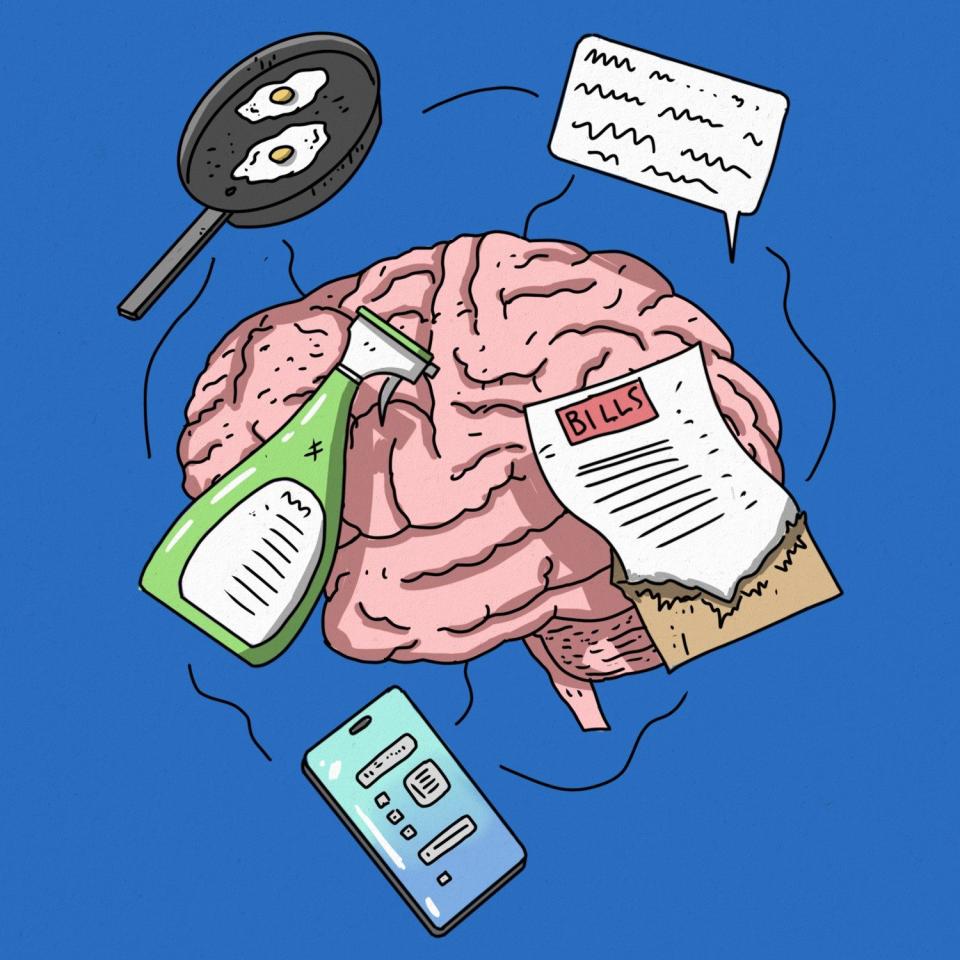Why multitasking is bad for your brain

I am one of life’s busy multi-taskers. I can cook dinner as I chat to a friend on the telephone, while also answering a work email, feeding the dog and compiling a shopping list for a forthcoming birthday celebration. Except, the trouble is, I forget to add salt to the chicken, I miss something important my friend tells me, the email is grammatically wrong, the dog gets the cat’s food and I put the list down somewhere, never to be found again.
Multitasking is brandished as an exceptional life skill; flaunted on CVs as a “must-have attribute” and held up – often by women – as a superpower. Yet studies show that multitasking is a bit of a myth. Yes, you can carry out tasks in succession; you can even manage them at super speed if you are that way inclined. But once they start overlapping, things tend to go skew-whiff. Perhaps that explains why yesterday, when I was writing an article for this paper and trying to listen to my husband explain why the fridge had stopped working, he accused me of not paying attention.
I tried a falsely assertive, “I heard everything you said.” But not being a buffoon, he sussed that my vacant stare was emblematic of a confused brain. I’m loath to admit it, but it’s true – my grey matter often can’t cope with more than one thing at a time. So, perhaps I am not the competent multitasker I once claimed to be. How will I ever manage to get everything done now?
Why do we feel the need to multitask?
In our culture of more, more, more, we’ve created a sense that being dextrous in doing a multitude of things is something to be revered. Oh, just look at that woman who can run a thriving business while jiggling her baby on her hip and holding her own in a heated conversation about the economic state of this country. Like many of us, she has been put on a precarious pedestal. Not only does a confirmed multitasker feel the mental pressure of their so-called demanding label, but the stakes are upped when it comes to danger and risk. Hands up if you can admit to any of the following… Driving and looking at your phone. On a zoom call and checking emails. Boiling a pan of water and trying to recall where you left your keys.

Dr Roz Halari, a consultant clinical and neuropsychologist at The Soke, a mental health centre in London, says, “Multitasking really does affect productivity and efficiency. We are not as focused and the brain processes information slower, so we are more likely to make mistakes. That might mean not understanding something correctly, or missing out on crucial information or, more seriously, having an accident that could endanger you and others.”
Can we really multitask?
Most experts agree that it is extremely difficult. But it is possible if the tasks are not too taxing on our brain’s capacity and we carry them out on autopilot, like driving a car and listening to the radio, or taking a walk while chatting with a friend. But more complex tasks demand more attention, and that’s when it becomes nigh-on impossible to do two things at once.
So, in fact, it’s more likely we are actually “task switching” – rapidly moving from one task to another. There is still a downside to jumping from task to task. The brain must work harder to unscramble the competing information, and so focus and accuracy is lost. That’s why you might experience that twilight moment when you stop to stare into space and wonder, “Now what was I just trying to do…?”
Various studies indicate that multitaskers are less productive, make more mistakes and are easily sidetracked. One study by the American Psychological Association found that multitasking can actually slow down productivity by 40 per cent. It may say “great at multitasking” on your CV, but, in fact, it could scupper your reputation and chances of success at work.
There are other repercussions too. Professor Nilli Lavie, a cognitive neuroscientist at UCL University, says, “Our brain-imaging studies have shown that too much information at once can cause ‘inattentional blindness’ and even deafness, where a person temporarily stops seeing and hearing certain things because the brain doesn’t have the capacity to process it all.” While efficient multitasking eludes most of us, Lavie’s research does in fact reveal that some individuals with more grey matter in their frontal cortex – the part of the brain that influences goal-oriented behaviour, attention, planning and organisation – are able to do it. However, other studies suggest these exceptional beings remain in the minority, with just 2.5 per cent of human brains showing such aptitude.
Why multitasking saps our health
Most of us are wired to do one thing at a time. So when we push ourselves to take on more, there will be negatives. Denise Freeman, a BACP (British Association for Counselling & Psychotherapy) therapist says, “My clients who pride themselves on multitasking are often the most stressed and anxious. On the surface they appear to be organised and efficient, but they are internalising the pressure of trying to do it all.
They come into my practice room and present a persona of how they think they should be – someone who is coping – but often they are negating the anger and resentment they really feel about their situation.” Denise has also noticed the impact multitasking can have on sleep, blood pressure, overeating and autoimmune diseases. “These people are fatigued to their core”, she says, “There is no let-up and they don’t know how to stop taking on more. Burnout is a real risk factor.”
Dr Halari has noticed the impact on memory in her patients who engage in chronic multitasking. “When your brain is constantly switching focus, you are processing data on a superficial level and so the capability to hold on to detail and facts is lessened. Recall and memory suffer as a result. How many of us have answered the phone while unpacking the weekly food shop, then later wondered why the washing up liquid is sitting in the fridge?”
Multitasking doesn’t help our relationships either
I often wonder if I am a good listener. I’d like to believe I am, but my family frequently accuse me of not hearing what they’ve just said. Hand on heart, I do try, but I know my mind is often waylaid by the next chore on my list of things to do. So, if I am thinking about booking the dog’s grooming appointment while cooking a roast lunch, can I really be paying attention to my son’s tale of what happened at his latest football match? I’ve started asking myself, is multitasking worth it when it means you are absent from the nuances of your kids’ life?
Freeman expands on those clients of hers who feel overloaded by multitasking. “They can miss out on crucial relationships by veering towards hyper-independence, which basically means they are extremely self-reliant and avoid asking others for help. But this can impact important connections, because people feel pushed away, or powerless to offer support. The multitasker can’t admit they are struggling, while friends, family and colleagues become frustrated by their insistence to carry on regardless. You end up with both parties feeling isolated and even resentful.”
Again, I wonder if this applies to me? Friends have previously remarked that I never ask for help. I’ve always worn my ability to cope as a badge of honour, but am I alienating myself from those I love and driving them crazy with my dogged autonomy?
Being a mono thinker is the way forward
There is an alternative: one thing at a time. In her book The Five Resets, Dr Aditi Nerurkar, a stress expert, recommends monotasking as “a way to protect your brain from burnout and stress”. This can be achieved, she says, by creating “time blocks” and following the guidance of the Pomodoro Technique, a time management tool developed by Francesco Cirillo in the late 1980s after he used a tomato-shaped kitchen timer (pomodoro is the Italian word for tomato) to allocate breaks. The idea is to use a system to give yourself 25 minutes to work on just one task. When your time is up, you take a five-minute break, then reset for another 25 minutes to work on a different task. You do this four times, and then you take a 30-minute break. Research shows this helps participants become better focused to reach end goals more successfully. The Pomodoro Technique has also seen positive results in those with ADHD, where flitting from one task to another is typical.
Dr Halari agrees that the benefits of “getting the job done” are significant. “The sense of accomplishment helps improve a person’s confidence and self-esteem, plus resilience and concentration improve. And the more you practise monotasking, the more the brain performs accordingly,” she says.
Prof Lavie confirms, “A recent study carried out in my lab showed that even very short breaks in task performance allow people to regain their attention focus. And while the brain cannot physiologically overload, the person may feel stretched to capacity when trying to cram too much information from a multitude of tasks at the same time. The brain simply can’t process all the information and so you are more prone to missing parts, which can result in errors and being less productive. It is far better to schedule tasks so that each can get your full attention. Our research also shows that people say that they feel happier when they can focus their attention on what they are doing.”
In The 5 Resets, Dr Nerurkar talks about how the brain loves compartments and rituals. She says, “Just like your brain is wired to monotask rather than multitask, you are your most fulfilled, productive and actualised self when you’re not being forced to multipurpose.” Sounds like a dream to me. Finally, I have concrete proof that the purpose of my existence isn’t to keep life in perpetual motion like some plate-spinning maestro who bedazzles the expectant circus crowds with their prowess. I can take my time and adopt a more steadfast approach. What a blessed relief.

What actually happens to your brain when you multitask
Stress levels go up. Research shows that cortisol (the stress hormone) increases. When we up the task ante, we tend to feel overloaded, and so anxiety and mental exhaustion occur.
Our brain structure can change. One study at Sussex University found a link in lower density of the brain’s grey matter and people who frequently used several digital devices at the same time.
Attention span decreases. Prof Nillie Lavie, a cognitive neuroscientist at UCL University, says, “Multitasking involves a lot of back and forth switching of your attention between the different tasks. This has a toll on our attention as it takes the brain a while to re-focus attention on another task after you have switched away from the previous one. As a result, you become more distractible and your attention span is weakened.”
Productivity is lessened. When you multitask, your focus is diluted and that impacts productivity levels and the chances of you reaching your end goal.
Fall in IQ research from the University of London found both men and women experienced a drop in IQ when multitasking. Women did better with a five-point drop, while men suffered a lower 15-point drop. Both had a decline in capability.
Quality of work deteriorates When your brain is trying to sift through the various strands of information of a multitasking quagmire, it is more difficult to hone in on specifics. Prof Lavie adds, “The more a task takes up your attention, and uses the bulk of your brain processing capacity, the slower you will be able to switch to another task.